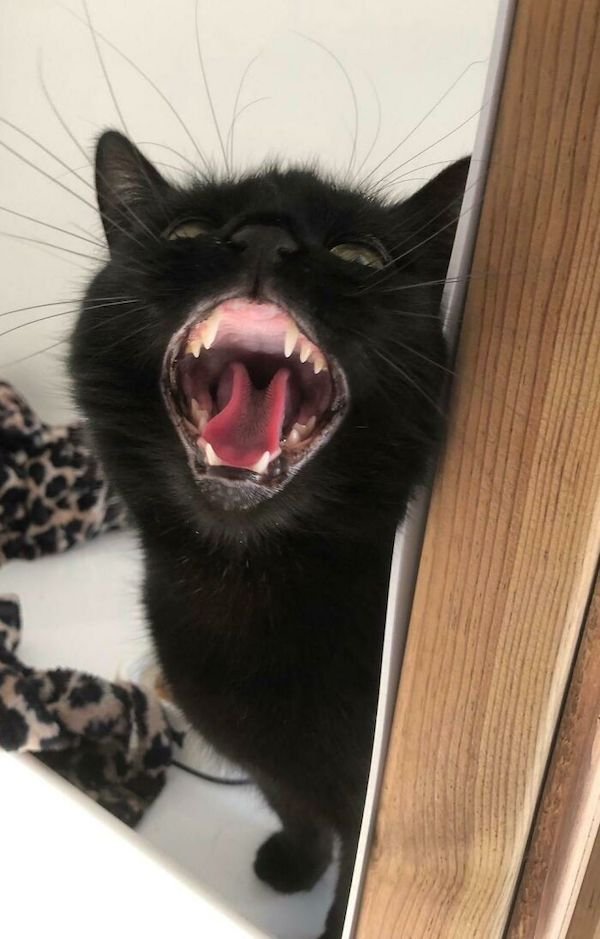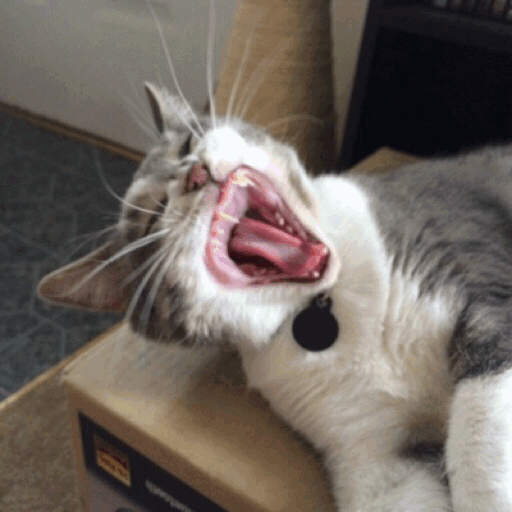Fearful Feline At The Vet: Unraveling The Reasons Behind Cat Screaming
Why do cats scream at the vet? Cats are known for their independence and aloofness, but they can also be very vocal when they're unhappy. One of the most common places for a cat to scream is at the vet's office.
There are a few reasons why cats might scream at the vet. One reason is that they are scared. The vet's office is a strange and unfamiliar place, and there are many new people and smells. This can be overwhelming for a cat, and they may react by screaming.
Another reason why cats might scream at the vet is that they are in pain. The vet may be examining or treating a painful area, and this can cause the cat to scream. Additionally, some cats may have a medical condition that causes them to be more sensitive to pain.
- Ella Langley Relationships
- Aishah Onlyfans Leaks
- Joe Burrow Personal Life
- Kensleypope Onlyfans Leaks
- What Is Trey Yingsts Nationality
It is important to note that not all cats will scream at the vet. Some cats are more tolerant of handling and examination than others. However, if your cat does scream at the vet, it is important to try to stay calm and reassuring. You can also try to distract your cat with treats or toys.
If your cat is screaming at the vet, it is important to let the vet know. The vet can then take steps to minimize your cat's stress and discomfort.
Cat Screaming at Vet
Cats are known for their independence and aloofness, but they can also be very vocal when they're unhappy. One of the most common places for a cat to scream is at the vet's office. There are many reasons why a cat might scream at the vet, including fear, pain, and illness.
- Fear: The vet's office is a strange and unfamiliar place, and there are many new people and smells. This can be overwhelming for a cat, and they may react by screaming.
- Pain: The vet may be examining or treating a painful area, and this can cause the cat to scream. Additionally, some cats may have a medical condition that causes them to be more sensitive to pain.
- Illness: Some illnesses can cause cats to experience pain or discomfort, which can lead to screaming. For example, cats with urinary tract infections may scream when they urinate.
- Hunger: Cats who are hungry may also scream at the vet's office. This is especially true if they are used to being fed at a regular time and their meal is delayed.
- Attention-seeking: Some cats may scream at the vet's office simply because they want attention. This is especially true if they are used to getting a lot of attention from their owners.
- Previous negative experiences: If a cat has had a negative experience at the vet's office in the past, they may be more likely to scream during future visits.
- Breed: Some breeds of cats are more likely to scream than others. For example, Siamese cats are known for being very vocal.
It is important to note that not all cats will scream at the vet. Some cats are more tolerant of handling and examination than others. However, if your cat does scream at the vet, it is important to try to stay calm and reassuring. You can also try to distract your cat with treats or toys.
If your cat is screaming at the vet, it is important to let the vet know. The vet can then take steps to minimize your cat's stress and discomfort.
Fear
The fear of the vet's office is a common reason why cats scream. Cats are creatures of habit and routine, and they can become stressed and anxious when they are taken out of their familiar environment. The vet's office is a strange and unfamiliar place, with new people, smells, and sounds. This can be overwhelming for a cat, and they may react by screaming in an attempt to express their fear and anxiety.
- Unfamiliar environment: The vet's office is a strange and unfamiliar place for a cat. There are new people, smells, and sounds, which can be overwhelming for a cat. This can lead to fear and anxiety, which can cause a cat to scream.
- Restraint: Cats are often restrained during vet visits, which can be stressful for them. This can lead to fear and anxiety, which can cause a cat to scream.
- Pain: Some cats may scream at the vet because they are in pain. This could be due to a medical condition, such as an injury or illness, or it could be due to the vet's examination or treatment.
- Previous negative experiences: If a cat has had a negative experience at the vet's office in the past, they may be more likely to scream during future visits.
It is important to be aware of the signs of fear and anxiety in cats, so that you can help to reduce their stress and make their vet visits more comfortable. If your cat is screaming at the vet, it is important to let the vet know. The vet can then take steps to minimize your cat's stress and discomfort.
Pain
Pain is a common cause of screaming in cats at the vet's office. Cats may experience pain for a variety of reasons, including injuries, illnesses, and medical procedures. Even minor pain can cause a cat to scream, especially if the cat is already stressed or anxious.
- Injury: Cats may scream if they are injured, such as if they have a broken bone or a wound. The pain of the injury can cause the cat to scream.
- Illness: Cats may also scream if they are ill, such as if they have a urinary tract infection or a dental problem. The pain of the illness can cause the cat to scream.
- Medical procedures: Cats may also scream during medical procedures, such as vaccinations or blood draws. The pain of the procedure can cause the cat to scream.
- Increased sensitivity to pain: Some cats may be more sensitive to pain than others. This can be due to a variety of factors, such as age, breed, and overall health. Cats that are more sensitive to pain may be more likely to scream at the vet's office.
If your cat is screaming at the vet's office, it is important to let the vet know. The vet can then take steps to minimize your cat's pain and discomfort.
Illness
Cats with urinary tract infections (UTIs) often experience pain and discomfort when urinating. This is because the infection can cause inflammation and irritation of the urethra, which is the tube that carries urine from the bladder to the outside of the body. The pain and discomfort can cause the cat to scream, especially when they are trying to urinate.
UTIs are a common cause of screaming in cats at the vet's office. This is because cats with UTIs are often brought to the vet for treatment. The vet will typically perform a physical examination and urinalysis to diagnose a UTI. Treatment for a UTI typically involves antibiotics and pain medication.
It is important to be aware of the signs of a UTI in cats, so that you can get your cat treatment as soon as possible. Signs of a UTI in cats include:
- Straining to urinate
- Urinating more frequently than usual
- Urinating outside of the litter box
- Blood in the urine
- Crying or screaming when urinating
In conclusion, illness is a common cause of screaming in cats at the vet's office. UTIs are a particularly common cause of screaming in cats, as they can cause pain and discomfort when urinating. It is important to be aware of the signs of a UTI in cats, so that you can get your cat treatment as soon as possible.
Hunger
Hunger is a common cause of screaming in cats at the vet's office. Cats are creatures of habit and routine, and they can become stressed and anxious when their normal routine is disrupted. If a cat is used to being fed at a regular time and their meal is delayed, they may become hungry and start to scream.
- Feeding schedule: Cats who are used to being fed at a regular time may become hungry and scream if their meal is delayed. This is because they are expecting to be fed at a certain time, and when their food is not available, they may become anxious and stressed.
- Appetite: Some cats have a very strong appetite and may be more likely to scream if they are hungry. This is especially true for kittens and young cats, who are still growing and need to eat more frequently.
- Stress: Hunger can also be a stressor for cats. When a cat is stressed, they may be more likely to scream. This is because screaming is a way for cats to express their anxiety and frustration.
If your cat is screaming at the vet's office, it is important to let the vet know. The vet can then rule out any medical causes for your cat's screaming and make sure that your cat is not hungry. If your cat is hungry, the vet may recommend feeding your cat a small snack or meal before the examination.
Attention-seeking
Attention-seeking is a common cause of screaming in cats at the vet's office. Cats are social creatures and they crave attention from their owners. If a cat is used to getting a lot of attention from their owner, they may start to scream at the vet's office in order to get attention from the vet.
There are a few things that can contribute to attention-seeking behavior in cats. One is a lack of attention from their owners. If a cat is not getting enough attention from their owner, they may start to act out in order to get attention. Another contributing factor is boredom. If a cat is bored, they may start to scream in order to get some excitement.
Attention-seeking behavior can be a challenge to deal with, but there are a few things that you can do to help reduce it. One is to make sure that your cat is getting enough attention from you. This means spending time with your cat each day, playing with them, and petting them. Another thing that you can do is to provide your cat with plenty of toys and activities to keep them entertained.
If you are having trouble with attention-seeking behavior in your cat, you should talk to your veterinarian. They can help you to determine if there is an underlying medical cause for the behavior and recommend ways to manage it.
Previous negative experiences
Cats are creatures of habit and routine, and they can become stressed and anxious when their normal routine is disrupted. A visit to the vet's office can be a stressful experience for any cat, but it can be even more stressful for a cat that has had a negative experience at the vet's office in the past.
- Fear and anxiety: A cat that has had a negative experience at the vet's office may be fearful and anxious about future visits. This fear and anxiety can lead to screaming, as the cat tries to express its distress.
- Pain and discomfort: A cat that has had a negative experience at the vet's office may associate the vet's office with pain and discomfort. This can lead to screaming, as the cat tries to avoid or escape the perceived threat.
- Lack of trust: A cat that has had a negative experience at the vet's office may lose trust in the vet and other veterinary staff. This lack of trust can make it difficult for the vet to examine and treat the cat, and it can also lead to screaming.
If your cat has had a negative experience at the vet's office, it is important to be aware of the signs of fear and anxiety. These signs can include screaming, hiding, trembling, and dilated pupils. If you see any of these signs, it is important to let the vet know. The vet can then take steps to minimize your cat's stress and discomfort.
Breed
The breed of a cat can play a significant role in its likelihood to scream at the vet. Some breeds of cats are simply more vocal than others. Siamese cats, for example, are known for being very vocal and may be more likely to scream at the vet than other breeds of cats.
- Vocalization: Different breeds of cats have different vocalization patterns. Some breeds, like Siamese cats, are known for being very vocal and may be more likely to scream at the vet. Other breeds, like Persian cats, are known for being relatively quiet and may be less likely to scream at the vet.
- Temperament: The temperament of a cat can also play a role in its likelihood to scream at the vet. Some breeds of cats, like Siamese cats, are known for being more outgoing and curious. These cats may be more likely to explore their surroundings and may be more likely to vocalize, including screaming, at the vet.
- Socialization: The socialization of a cat can also play a role in its likelihood to scream at the vet. Cats that are well-socialized and used to being handled may be less likely to scream at the vet than cats that are not well-socialized or are not used to being handled.
It is important to note that not all cats of a particular breed will scream at the vet. However, some breeds of cats are more likely to scream than others. If you are concerned about your cat's likelihood to scream at the vet, you should talk to your veterinarian.
FAQs on "Cat Screaming at Vet"
Visiting the vet can be a stressful experience for cats, leading to vocalizations such as screaming. Here are some frequently asked questions to help understand and address this behavior:
Question 1: Why do cats scream at the vet?
Cats scream at the vet due to various reasons, including fear, pain, illness, hunger, attention-seeking, previous negative experiences, and breed-specific traits.
Question 2: How can I prevent my cat from screaming at the vet?
To prevent screaming, try to reduce your cat's anxiety by familiarizing them with the carrier and vet's office beforehand. Ensure they are not hungry and consult with the vet about any underlying medical conditions. Positive reinforcement and calming aids may also be beneficial.
Question 3: What should I do if my cat screams during the vet visit?
If your cat screams during the visit, remain calm and reassure them. Inform the vet, who can assess for any underlying medical issues and provide appropriate care. Consider using a calming pheromone spray or a towel to create a safe space for your cat.
Question 4: Are certain cat breeds more prone to screaming at the vet?
Yes, certain breeds like Siamese cats have a higher tendency to be vocal and may scream more frequently due to their outgoing and curious nature.
Question 5: Can underlying health issues contribute to a cat's screaming at the vet?
Yes, underlying medical conditions such as urinary tract infections or injuries can cause pain or discomfort, leading to screaming. It's important to consult with the vet to rule out any health problems.
Question 6: How can I make vet visits less stressful for my cat?
To reduce stress, use a cat-friendly carrier, bring familiar items like a blanket, and create a positive association with the vet by providing treats or praise during the visit.
Remember, every cat is different, and understanding their individual needs and preferences can help alleviate their anxiety and make vet visits more manageable.
Transition to the next article section: Understanding the causes and addressing your cat's screaming behavior can contribute to a more positive and less stressful veterinary experience.
Conclusion on Cat Screaming at the Vet
Understanding the reasons behind a cat's screaming at the vet is crucial for addressing their anxiety and ensuring a more positive veterinary experience. By recognizing the various factors, including fear, pain, hunger, and breed-specific traits, cat owners can take proactive measures to reduce their pet's stress.
Familiarizing cats with the carrier and vet's office, addressing underlying medical conditions, and providing a calming environment can significantly minimize screaming behavior. Additionally, positive reinforcement and pheromone sprays can further enhance their comfort levels. It's essential to remember that each cat is unique, and tailoring approaches to their individual needs is key.
- Tessa Tasty
- Alexys Nycole Sanchez
- Jack Doherty And Mckinley Leak
- Camilla Araujo Of Pics
- Marlene Santana Leak

Screaming Cat Meme

Screaming Cats (30 pics)

Trippy Screaming Cat Gif Gifdb Com My XXX Hot Girl